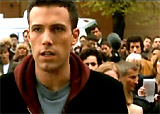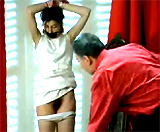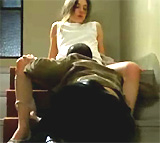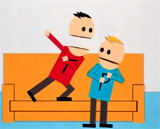
|
Films of All-Time 1996-1999 |
| Film Title/Year, Director | ||||||||||||||||||||||||||||||

|
Crash (1996)
David Cronenberg's coldly-erotic, dark and disturbing drama examined the lives of a subculture of individuals who had passionate sexual fetishes about deadly car crashes. [Note: This film was not to be confused with Best Picture-winning Crash (2004).] The alternating kinky, perverse and depraved sex scenes juxtaposed with gruesome car crashes was deliberately controversial and repulsive, and thought to possibly inspire people to have fetishistic sex in high-speed vehicles. This provocative film, initially released in two versions rated NC-17 and R, was vilified in much the same way as Michael Powell's Peeping Tom (1960, UK), and the Cannes Film Festival screening had people walking out in disgust, nausea and revulsion. Ultimately, it received a Special Jury Prize "For Originality, For Daring, and For Audacity." It told about a couple (in an open-marriage) who found sexual satisfaction in unusual ways:
In the opening scene that showcased one of three couplings, Catherine enjoyed sex while in contact with cold-steel (she was taken from behind by her flight instructor in a private aircraft hangar as her naked breast's nipple pressed into a steel airplane wing). Wife Catherine (who displayed her bare rear through her skirt) was also watched by husband James as she stood on their apartment balcony - and then he entered her from behind as she gripped the balcony rail above the busy highways below. When James collided with another car on the freeway in a near-fatal accident, the deceased victim/husband passenger was thrown through the windshield onto his hood, while the driver/wife Dr. Helen Remington (Holly Hunter) inadvertently revealed partial nudity when she broke free from her seat belt in the twisted wreckage. She freed herself from her seatbelt and tore open her blouse to expose her breast to him as they stared at each other amidst the wreckage. Subsequently, their first sexual encounter was in the front seat of his new car (same make and model) at an airport garage, as a way to re-establish the 'eroticism' of the crash. Ballard continued his extra-marital affair with Helen, always with love-making in his car in a public place. The experience caused Ballard to have increased sexual excitement toward his wife and their own rear-entry love-making.
After the accident, the three characters were introduced to a weird cult of individuals who derived sexual pleasure and arousal from car crashes, either as survivors or as impact victims with violated bodies. They would compulsively excite themselves ("It's all very satisfying") by re-enacting (or recreating) famed auto accidents ("the ultimate in authenticity" - the noteworthy car accident of famous Hollywood legend James Dean (Sept 30, 1955)). The leader of the car enthusiasts was Vaughan (Elias Koteas) who described his philosophy (and next project) to recently-scarred and injured accident victim James Ballard. Vaughan was driving, while passenger Ballard was looking at car-crash photographs, and commenting: "It's all very satisfying. I'm not sure I understand why." Vaughan replied:
After purposely being tantalized on the road by reckless driving performed by Vaughan, Catherine became excited with homo-erotic sex-talk about how James might have anal sex with him, and she kept making statements about his bodily fluids ("Vaughan's semen must be very salty"). They would also observe and talk about their physical deformities from crashes (including wounds, scars, dismemberment, leg braces, crutches and full-body support suits), watch car safety and test crash videos (as pornography) and photograph crash victims, engage in sex in parked or moving cars (even in a car wash), and recklessly drive their cars near each other as foreplay. Physically-deformed impact victim Gabrielle (Rosanna Arquette) made love to Ballard in a car while braced or harnessed with a full-body support suit of black plastic and stainless steel - she offered him her vulva-like gash/scar ("neo-sex organ") on the back of one of her thighs after he ripped off her black fish-net stockings. She fondled her own breast as he kissed her leg and then made love to it. In the film's startling conclusion, Ballard deliberately rear-ended his wife's sports-car. She was thrown from the car onto the ground next to the wreck, where he made love to her from behind, after she regained consciousness and he learned that she was all right. He promised her a more deadly crash the next time:
|
 Catherine (Deborah Kara Unger)  Catherine on Balcony   Car-Crash: Dr. Helen Remington (Holly Hunter)   Car-Wash Sex     Love-Making With Gabrielle's (Rosanna Arquette) Car-Accident Scar   Climactic Car Crash |
||||||||||||||||||||||||||||

|
Lolita (1997)
Director Adrian Lyne's 1997 erotically-charged, sensual version of Vladimir Nabokov's novel (and a remake of Stanley Kubrick's 1962 film) told about a young 14 year-old "nymphet" (15 year-old Dominique Swain at the time of filming) and an obsessed professor named Humbert Humbert (Jeremy Irons). From the start, its coverage of an aberrant, still-taboo and touchy topic of underage sexuality and incestual pedophilia brought intense criticism. Christian fundamentalists and other extremist groups accused the film of promoting pedophilia, although it was entirely dubious that the film condoned or promoted anti-social behavior. The film contained virtually no female nudity (a body double was used in one brief dimly-lit night sex scene), and strict precautions were taken during filming. It was produced on the heels of the Child Pornography Prevention Act of 1996 and the murder of 6 year-old JonBenet Ramsey (publicized as being a beauty pageant contestant). After European showings, it failed to get a distributor for an American theatrical release. Cuts were demanded to bring the film into conformity with the 1996 law. After a limited one-week US theatrical run in LA (to qualify for Academy Awards consideration), it was eventually bought by Showtime cable channel for viewing - which showed it on August 2, 1998 (providing its national premiere in uncut form). Its video rights were purchased by Blockbuster in early 1999, but since Blockbuster refused to rent NC-17 films -- it could only be seen in a heavily-censored version differing from the European release version or the cable version. The film opened with Humbert in lyrical voice-over describing Lolita:
The story was told in flashback. It began with an explanation regarding the cause of British Professor Humbert's hebephilia (sexual preference for pubescents). The opening sepia-toned sequence recalled Cannes, France in 1921, where 14-year-old Humbert (Ben Silverstone) become "madly hopelessly in love" with a beautiful 14 year-old girl named Annabel Leigh (Emma Griffiths-Malin). Four months later, when she died of typhus, he was marked and wounded for life - becoming a broken-hearted, tortured and helplessly unrequited romantic.
Humbert accepted a teaching position at Beardsley College (in the New England town of Ramsdale) in 1947, where he had become a boarder at the home of widow Mrs. Charlotte Haze (Melanie Griffith). He was convinced to rent a room after the first view of long-limbed schoolgirl Lolita in the garden piazza where a lawn sprinkler soaked her pale sundress.
Entranced by the provocative and brash "nymphet" who innocently and playfully teased him, he would daydream about her, lose sleep, and call her a "little deadly demon." Lolita's annoying mother Charlotte was concerned that her maturing daughter was bothering Humbert, asking: "Is she keeping you up?" Before Lolita was taken off to summer camp by her mother, she gave Humbert a memorable goodbye hug and kiss after she jumped into his arms. To keep close to Lolita, Humbert accepted Charlotte's proposition that he marry her and become a "father" to her "little girl." Just as Charlotte discovered Humbert's secret papers divulging interest in Lolita and calling herself a "cow", Charlotte was fortuitously struck by a car outside their house, allowing him to have "Lolita in my arms." When he picked her up at camp, she admitted: "I've been revoltingly unfaithful to you," and then asked for a kiss. He pulled over and obliged her - she hopped into his lap for two sensuous kisses. When they spent an overnight in a hotel, they were forced to share a room with only a double bed. Lolita blurted out the word "incest" (forbidden love) when they talked about how they were "thrown together" and sharing the same hotel room as father/daughter. In the room after dinner, as he removed her ankle-socks, she confided: "If I tell you how naughty I was at camp, promise you won't be mad?...I've been such a disgusting girl, just let me tell you." Early the next morning after sleeping in the same bed, in one of the film's most controversial scenes, she turned over and wet-kissed him on the mouth with a French kiss. She then whispered in his ear that she had played sexual games with Charlie while at camp. She then said she would have to demonstrate what she had learned: "I guess I'm gonna have to show you everything" and as a prelude to oral sex and intercourse, she started to remove his pajama bottoms (and her own retainer) before a fade-out. Hubert explained in voice-over: "Gentlewomen of the jury, I was not even her first lover." Later, Humbert was curious and asked if Charlie was her "first one." He felt "more and more uncomfortable" about corrupting her innocence, especially after she said that she hurt inside: "I was a daisy-fresh girl and look what you've done to me. I should call the police and tell them that you raped me, you dirty old man" - but then smiled teasingly. He mused during extensive road travels with the precocious Lolita that "despite all the fuss, the faces she made and the danger and hopelessness of it all, despite all that, I was in paradise, paradise whose skies were the color of hell flames, but a paradise still." In the film's most sensual scene, Lolita rocked pleasurably on Humbert's lap while reading the newspaper comic pages. When Humbert began teaching at Beardsley College in the fall, Lolita was enrolled in the Beardsley Prep School (for Girls). Humbert considered himself both "the willing corruptor of an innocent" and a "happy housewife."
In another scene, Lolita manipulatively stroked his thigh with her bare foot ("You want more, don't you?"), then nuzzled next to his crotch, inched her hand up his inner thigh, and bargained for $2 (instead of her usual $1/week allowance). When their relationship cooled and tensions rose, Humbert paid her for sex: "As she grew cooler towards my advances, I became accustomed to purchasing her favors." Ironically, school administrators began to be worried that the sexual maturing Dolores was "morbidly disinterested in sexual matters" and that she needed family instruction in the process of human reproduction. More strains occurred when Humbert showed a distrust of Lolita, and she was increasingly involved with playwright Clare Quilty (Frank Langella) during rehearsals for the school play. Long simmering hatred erupted when she accused Humbert of murder and howled at him: "Murder me like you murdered my mother!" But then desperate not to lose her, they made up only hours later, when she undressed in front of him and requested: "Take me to bed." During a second extended road trip, Lolita provocatively mouthed a banana while wearing a white two-piece outfit. Jealousy continued to rise between the two, and he suspected that she had another rival lover like himself ("another mad lover of nymphets" - revealed in the film's conclusion to be playwright Clare Quilty (known to her as Uncle Gustave)), who was thought to be following them. He caught her, obviously guilty and lying, with smudged lipstick on her face. Humbert forced his own kisses from her - as lipstick became smeared on their faces, while he begged to know the man's identity: "Please tell me." When Lolita was kidnapped by Quilty, Humbert could not locate her ("the trail went cold and dead"), until three years later, when she contacted him by letter. Destitute, married to a man named Dick and now pregnant as Mrs. Richard F. Shiller in the town of Coalmont, Lolita was seeking Humbert's financial assistance ("I have gone through much sadness and hardship"). She identified the 'thief' kidnapper as the pervert and child film pornographer Quilty, while Humbert still vowed that he loved her (even though she was "pale and polluted and big with another man's child"). She rejected his offer to "leave here and come live with me and die with me and everything with me" - but accepted his monetary help of $4,000 cash. Afterwards, Humbert vengefully murdered the monstrous Quilty in a gruesome, bloody and violent fashion in his mansion, with the jealous accusation: ("You cheated me of my redemption") - and then afterwards he calmly surrendered to police. He stood on a cow pasture hillside listening to the distant sounds of children playing and in an epiphany (voice-over), he expressed remorse for taking Lolita's 'childhood' away from her: ("What I heard then was the melody of children at play. Nothing but that. And I knew that the hopelessly poignant thing was not Lolita's absence from my side but the absence of her voice from that chorus"). He died on November 16th, 1950 in prison of a coronary thrombosis, while she died about a month later on Christmas day during childbirth. |
  Lolita on Humbert's Lap: "Am I getting a zit?"  Growing Attraction and Flirtations  Goodbye Kiss Before Leaving for Camp  After Summer Camp, Kissing in the Car  Confession of Being "Naughty" at Camp  Overnighting in the Same Double Bed  Lolita's "French Kiss"  "I Guess I'm Gonna Have to Show You Everything"  Pleasurably Reading the Comics Page While Rocking on Humbert's Lap  "Go ahead, murder me, like you murdered my mother!"  "Take me to bed"  Eating a Banana   Lolita With Smudged Lipstick - Humbert Pleaded: "Who is it?"  Married, Pregnant, Three Years Later   Quilty's Execution  Humbert's Final Epiphany (in voice-over) |
||||||||||||||||||||||||||||

|
Dogma (1999)
Director Kevin Smith's fourth film was an imaginative, comic and fanciful theological work (with foul language) about a monumental struggle or race between good and evil forces to save or determine the fate of Earth and mankind. The taglines for the film were:
The film's premiere drew hundreds of protesters and disdain from religious leaders, and Smith himself received 300,000 pieces of hate mail. The Catholic League publically criticized the film's producer Miramax Pictures (owned by Disney), for the film's anti-Catholic, sacrilegious and blasphemous stance, and its satire of modern religion. Consequently, Disney-owned Miramax declined to release the film, and sold its rights to another distributor (Lionsgate Films). On one side were two fallen, ousted or banished angels cast out of heaven: Angel of Death Loki (Matt Damon) and Bartleby (Ben Affleck), who had been exiled to eternity at an airport in Milwaukee, Wisconsin.
They discovered a loop-hole in Catholic dogmatic doctrine (plenary indulgence) that would allow them back into Heaven. However, if they succeeded, it meant that they could prove the fallibility of God and thereby destroy the universe by nullifying and undoing all of human and earthly existence. Their success would overrule the word of God, disprove the fundamental concept of God's omnipotence, and nullify all of existence. To have their sins forgiven, they decided to make their way to St. Michael's Cathedral that was about to be rededicated in Red Bank, New Jersey for its 100 Year Anniversary. They reasoned that if they entered the church's doors, they would be forgiven of their sins (with a plenary indulgence), and regain access to Heaven. They chose New Jersey because of a revamped 'Catholicism Wow!' campaign-program announced there by hip Catholic Cardinal Glick (George Carlin), who had replaced the traditional "Scary" crucifix with a "Buddy Christ" effigy. There, their plan was to have their wings cut off, die after transmuting into human form, and reenter the kingdom of heaven. To stop them, God (angry slack-rocker Alanis Morissette) dispatched a disdainful and bitchy seraphim - a messenger from God named Metatron (Alan Rickman) (aka The Voice of God), to appear in a pillar of fire in the bedroom of lapsed-and fallen Catholic Bethany Sloane (Linda Fiorentino) who worked at an Illinois Planned Parenthood abortion clinic. To prove that he was as "anatomically impaired as a Ken Doll" and couldn't rape her if he wanted to, he pulled down his pants.
The resistant, infertile and divorced woman, who was experiencing a crisis of faith but was Jesus Christ's last surviving blood-relative descendant (the last scion), would be recruited to stop the two rogue angels from ending humanity. Metatron instructed her to meet two muses or prophets (Kevin Smith and Jason Mewes as dope-dealing slackers Silent Bob and Jay) who would assist her along the way - to stop the angels from entering a newly discovered back door to heaven, and help save the universe. Other characters in the tale joining them included:
While Bethany was on a train to New Jersey, she spoke of her mission to Bartleby, who attempted to slit her throat but was prevented from doing so. Shortly later, Loki realized the serious consequences of their scheme to enter the church and wanted to "rethink this whole thing." He backed out ("You're talking about f--king war on God!"), but the angry Bartleby was adamant about proceeding with their plan on his own. Pompous, regenade Cardinal Ignatius Glick was delivering a speech on the steps of the New Jersey St. Michael's Church during the ceremony, when Bartleby stepped up, pushed through the crowd, and threatened the assembled parishioners:
Bartleby twisted Officer McGee's (Robert Holtzman) head to the right to break his neck ("Mr. McGee, don't make me angry. You wouldn't like me when I'm angry") - causing a riot. He spoke above the tumult's screams: "Ladies and gentlemen, you have been judged as guilty of violations against our Almighty God. And this very day, I assure you, you will all pay for your trespasses, in blood. (To Loki) Wings. Now! Do it!" Bartleby killed the parishioners in attendance at the celebration, including Cardinal Glick and other bystanders. A panicked TV reporter issued a statement about the proceedings:
The exterior of the church was littered with massacred bodies, viewed by the group that had just arrived - Jay, Serendipity, Silent Bob, Bethany and Rufus. Slacker Jay asked: "Then what the f--k are we supposed to do? Just wait for a solution to fall out of the sky?" On cue, the Cardinal's decapitated body plummeted to Earth and landed splat at their feet. A drunken Loki emerged and identified the headless corpse:
With his wings cut off, Loki was now human (and mortal) and decided to help the side of the good, but watched as Bartleby returned and fought off Serendipity, threatened Bethany and the others. Loki resisted Bartleby ("This has gone too far. I might have to take you down"), who then killed his "compatriot" by stabbing him in the side. To weaken Bartleby, Jay shot off his wings with a submachine gun and inadvertently turned him into a human being. Bartleby licked his bloody fingers and realized he was now human - he laughed maniacally and outstretched his arms toward heaven.
At the church entrance, the film concluded with the female God figure annihilating a remorseful Bartleby with Her mighty vibrating voice that exploded his head. God also resurrected Bethany from death and immaculately conceived a female child within her - that would become the new last scion. |
 Cardinal Glick's Campaign  Cardinal Glick (George Carlin)  Bethany Sloane (Linda Fiorentino)  Jay and Silent Bob  Two Prophets with Bethany  Rufus (Chris Rock)  Serendipity (Salma Hayek) in a Strip Club  Bartleby's Threat on the Train to Kill Bethany   Bartleby Interrupting Cardinal Glick at Church Ceremony  Breaking Officer McGee's Neck  Mass Destruction at the Church, Including the Decapitation of the Cardinal  On the Side of Good, Against Bartleby   God's Confrontation with Bartleby  Bethany Dead - Before Being Resurrected by God - With a Child Inside of Her |
||||||||||||||||||||||||||||
  |
Romance (1999, Fr.) (aka Romance
X)
This sexually-graphic drama import from daring French filmmaker Catherine Breillat faced international censorship problems for its explicit depictions of fellatio and intercourse. The film's poster displayed a red X over a masturbating female's private parts, one of the scenes in the film. An overriding theme was the lack of connection between love and sex. The film was released with no MPAA rating, although it undoubtedly would have been an NC-17 rating with its full frontal nudity and explicit unsimulated oral sex - a turning point in the candid depiction of non-pornographic sex on screen for a mainstream film. It was the first mainstream movie to feature an erect penis. There were two main characters:
When she initiated sex with him and began fellating him, he responded disinterestedly. She requested that he touch and pleasure her, but seemed to feel that he despised her. Feeling dishonored, she left in the middle of the night. She began to contemplate finding unbridled sexual gratification and lustful fulfillment through various 'no-strings-attached,' explicit sexual encounters with others. One instance of random sex began almost immediately that evening with a studly stranger from an all-night bar. She soon began full sexual involvement (including rear-entry sex) with the Italian stranger, named Paolo (Italian porn star actor Rocco Sefredi).
She also became sexually intrigued and involved, in a "trivial" and "shameful" relationship, with her older boss Robert (Francois Berleand), a "prince of seducers," who claimed he had enjoyed 10,000 women (with a record of his conquests), and promoted her potential for S&M masochism, degradation and bondage. She was at first freaked by the experience - however, they maintained a long-term association: ("Tying me up without tying me down was the secret of his ritual"). Upon returning to Paul's empty bedroom, she masturbated with her legs tightly closed ("It's proof I don't need a man") -- providing the image for the film's red-X'ed poster - her self-pleasured private parts. Later, when she began pulling away from Paul, she became pregnant with his child during one rare act of sexual contact (through a drop of his seminal fluid without ejaculation). The film's additional scenes included a degrading rape (the rapist called her a "whore, bitch") in a stairway, a probing gynecological exam after Marie became pregnant by Paul, and later clear footage of her childbirth (edited and replaced by Blockbuster Video).
After her gynecological exam, the most controversial segment was a fantasy dream sequence in which she imagined herself sexually defenseless with other women. Their waists were available and positioned next to a hole in a wall as unseen strangers on the other side of the wall could engage in explicit sex with them through the opening. There was a close-up of ejaculation onto a female's stomach, juxtaposed with jelly being applied to Marie's belly for an ultrasound reading.
After nine months of drifting further apart from Paul, she left his apartment to deliver her baby, accompanied by Robert, while Paul was left passed out from booze in his apartment's bed, with the gas stove turned on - so that he would die in the subsequent explosion. The film ended abruptly with Paul's funeral and her voice-over:
|
   Unfulfilling Sex with Paul  Leaving the Apartment in the Middle of the Night  Paolo (Italian porn star actor Rocco Sefredi)     Marie's Relationship with Older Boss Robert   Self-Pleasuring Marie  More Random Sex - Rape |
||||||||||||||||||||||||||||

|
South Park: Bigger, Longer & Uncut (1999)
This R-rated, adult-oriented 81 minute animated film, a spin-off of the animated TV series South Park, and was based upon the Comedy Central TV show. Its subtitle was a reference to a large uncircumcised phallus, as well as to the earlier TV show (beginning in 1997) - it marked the fastest TV-to-Film adaptation in history. The often-vulgar, non-PC, and anarchistic animated musical showed satirical irreverence toward small towns, the movie ratings system, various religious icons, bad parenting, censorship, and much more. It was also judged as one of the most obscenity-filled, vulgar and profane animations ever made - clocking in at almost 400 profane words. At the time, it was notable for having more profanity (and curse words) than any other animated film. It contained many examples of offensive gestures, use of racial epithets and ethnic slurs, blasphemous references to God, scatological humor, and acts of violence by its young cast of characters. It was reported that many under-aged movie theatre patrons purchased tickets for other films in multiplexes and then the minors attended this popular, R-rated film (originally rated NC-17). The main plot was about four young boys (Stan Marsh, Kyle Broflovski, Eric Cartman, and Kenny McCormick), who were able to sneak into the showing of an R-rated movie. It was the viewing of a film within a film ("Asses of Fire") by the group of third-grade boys from South Park, Colorado - featuring Canadians Terrance (voice of Matt Stone) & Phillip (voice of Trey Parker), about lighting farts on fire. The duo also performed the vulgar song "Uncle F--ka" on-screen in "Asses of Fire."
In school the next day, the boys were profusely swearing at their teacher - the corruptive after-effects of seeing the film. Parents (mothers) were summoned and the school counselor Mr. Mackey (Trey Parker) led the anti-profanity sing-along song: "It's Easy, M'Kay," stressing through rehabilitation that one had to get "back in touch" and stop cursing or using bad words. Later after watching the forbidden film a second time, muffled-voiced, parka-clad third-grader Kenny (voice of Matt Stone) lit his flatulence on fire during a $100 bet with Eric (voice of Trey Parker), died (as usual) in the hospital and his soul was sent to Heaven (30 nude busty females were awaiting entry) - where he was rejected - and then to Hell where Satan was portrayed as the homosexual lover of recently-deceased Saddam Hussein.
As a result of the 'corrupted' boys, their parents in the South Park PTA (led by Kyle's mother Sheila Broflovski) formed "Mothers Against Canada" (M.A.C.). They pushed for censorship efforts against Terrance and Phillip, as well as the whole nation of Canada - to blame it for the ensuing corruption and misbehavior of the children - with the song "Blame Canada" ("We must blame them and cause a fuss before somebody thinks of blaming us!"). Terrance and Phillip appeared on TV - on the Conan O'Brien Show (Brent Spiner), a talk show, where they were arrested by the US Army and jailed as war criminals ("for corrupting America's youth") after being set up by M.A.C., while Conan committed suicide (although later revived). When the US refused to release the duo, the US was ultimately pressured into waging war against Canada.
To retaliate against corpulent foul-mouthed Eric, Sheila (now appointed U.S. Secretary of Offense) compelled Dr. Vosknocker (voice of Eric Idle) to implant a V-chip into Eric's brain to stop him from uttering profanities by delivering an electric shock: ("Now I want you to say 'big floppy donkey dick'"). The boys attempted to save their two Canadian idols from being executed by electrocution (in an electric chair) during a USO show, by uprising and forming a children's underground resistance force. They sought to form La Resistance, by singing: "What Would Brian Boitano Do?", and offering punch and pie to those who joined their effort; on the other hand, the US Army was planning to present the show and execution, and then send ground troops into Canada. During the chaos after the USO show and war, the boys freed Terrance and Phillip. Ultimately, a war against Satan and Saddam (who planned to rule the Earth) ended with their defeat and return to Hell, as everything returned to normal, and self-sacrificing Kenny entered Heaven, where he was greeted by two nude angels. It was an incongruous combination of a number of elements:
|
 Terrance Singing: "Uncle F--ka" in Film   "It's Easy, M'Kay"  "Blame Canada"  "Mothers Against Canada" (MAC)  USO Show  La Resistance  Kenny Entering Heaven, With Nude Angels |
||||||||||||||||||||||||||||

|
Stigmata (1999)
This predictable, non-sensical horror thriller with a music-video MTV style, followed on the heels of two other, more popular 'supernatural' horror films of the year, The Blair Witch Project (1999) and The Sixth Sense (1999). The poorly-paced, confused plot could not hope to compete when compared to the more effective The Exorcist (1973) from 25 years earlier (and re-released in 2000). The tagline was:
It boasted a soundtrack by Smashing Pumpkins, continual rain and dripping liquids, the enigma of mysterious forces, many split-second images of the horrors of Christ's crucifixion, and silly theological exposition about similarities between stigmata and demonic possession to make it more marketable as a horror film.
Stigmata presented a bold criticism of the Catholic Church, and posited a deadly conspiratorial role of the present-day institution (Vatican senior clergy) to cover up gnostic truth found in some hidden writings that had been uncovered by three priest-archaeologists (one of whom was Father Alemieda - see later). The three were subsequently demoted and the contents of the writings were suppressed. However, the truths that were supposedly being hushed were considered prominent principles of some parts of the Biblical record. Its story told about 23 year-old godless, atheistic, partying salon hairdresser Francis "Frankie" Paige (Patricia Arquette), who began to suffer torment after her unsuspecting mother sent her a vacation souvenir package. Inside was a rosary (sold to her by a local Brazilian marketplace vendor in the town of Belo Quinto), earlier stolen from the possession of beloved, deeply religious South American priest Father Paulo Alemieda (Jack Donner), who suffered from the phenomenon of stigmata. During Father Alemieda's funeral in the village church, a statue of the Virgin Mary of Guadalupe wept blood, doves appeared out of nowhere, and candles would mysteriously ignite and burn out. Father Alemieda had been ex-communicated from the church after he and others had discovered a heretical 'lost Gospel' and began to espouse its unconventional ideas about Jesus. The writings, based upon Jesus' last words to his disciples at the last supper about how to continue his mission after his death, preached that the kingdom of God was all around and not confined to institutional churches of brick and mortar: ("The kingdom of God is inside you and all around you, not in buildings of wood and stone. Split a piece of wood and I'm there. Lift a stone and you will find me."). With the rosary in her Pittsburgh apartment, Frankie began to display disturbing signs -- upsetting nausea and vomiting, struggling with unseen forces (and flashes of nails being pounded into flesh) during a bath (with blood-tinged water), and possible epilepsy (or demonic possession). She also began to develop a case of stigmata - evidence of Jesus' five crucifixion wounds on her own body, beginning with bloody wrist puncture wounds. The traditional five wounds were:
In the film, other wounds were added: whip lashings on Jesus' back and gashes on his forehead from the 'crown of thorns.'
Investigating her distressing condition in Pittsburgh was a Jesuit priest, Father Andrew Kiernan (Gabriel Byrne), who investigated miracles for the Vatican (he was a member of the Congregation for the Causes of the Saints). He was confused because normally the holy manifestations of stigmata developed only on those who were devout "deeply developed" believers. He found himself thwarted by the Vatican's nefarious, corrupt and evil Cardinal Daniel Houseman (Jonathan Pryce) (quoted as saying: "You have no idea who you're dealing with"), who wished to keep Frankie quiet. More serious symptoms developed for Frankie (a deliberate illusion to St. Francis who also suffered from the condition) - scratches and slashes on her forehead (the crown of thorns?), writing in cryptic Aramaic (Jesus' ancient language) on a car hood with a smashed glass bottle and later on a wall, speaking Italian in a deep male voice, and becoming transfixed in a crucifix pose in mid-air. When Kiernan was able to translate the Aramaic writings, he realized the key to everything was the Gospel of St. Thomas, part of an heretical series of secret Gnostic writings hidden by the Catholic Church because they could undermine and destroy the faith and the authority of the institutional church. Were the bellowings and writings of a possessed spirit benevolent - revealed as the continuing translation efforts of the spirit of the dead, excommunicated priest within Frankie? Later, the efforts of Cardinal Houseman to silence Frankie almost succeeded when he conducted a failed exorcism upon her in a bed followed by attempted strangulation. When Kiernan realized that the corpse of deceased priest Alemieda was speaking through Frankie, he offered to be the priest's messenger. In the film's climactic scene, he entered and walked through flames to the bed, retrieved Frankie, and successfully bid Alameida's spirit to be released within her to set her free, and to depart in peace. Some time later, Andrew visited Alemieda's Brazilian church and located the lost gospel writings (the Gospel of St. Thomas) hidden under the floorboards - with a handwritten translation. [In the DVD's alternate ending, Frankie died.]
The film concluded with three title cards (white text on black):
|
 The Rosary Gift-Souvenir  Bleeding Eyes of Virgin Mary Statue  Corpse of Father Alemieda at Funeral  "Frankie" Paige (Patricia Arquette)  Possessed - Speaking in Male Voice   Father Andrew Kiernan (Gabriel Byrne)  The Three Priests Challenging the Catholic Church     Cardinal Houseman's Attempted Exorcism and Strangulation of Frankie  Frankie In Bed: Surrounded by Flames   Father Kiernan Walking Through Flames, Begging Alameida to Free Her  Frankie Released from Alameida and Rescued |
||||||||||||||||||||||||||||
(chronologically, by film title) Intro | Silents-1930s | 1940s-1950s | 1960-1961 | 1962-1967 | 1968-1969 1970-1971 | 1972 | 1973-1974 | 1975 | 1976-1977 | 1978 | 1979 1980-1982 | 1983-1986 | 1987-1989 | 1990-1992 | 1993-1995 | 1996-1999 2000-2002 | 2003-2005 | 2006-2009 | 2010-present |